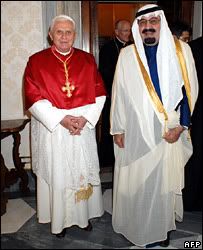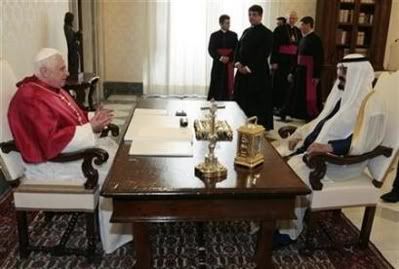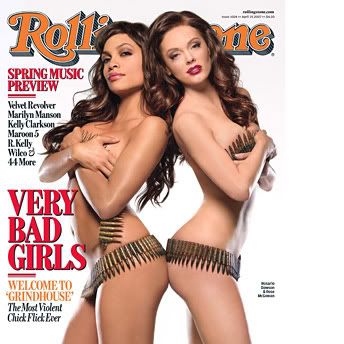
Historic Saudi visit to Vatican
http://news.bbc.co.uk/1/hi/world/europe/7080327.stm
King Abdullah of Saudi Arabia has met Pope Benedict XVI at the Vatican - the first audience by the head of the Roman Catholic Church with a Saudi monarch.
The private meeting lasted only 30 minutes, with both leaders speaking through interpreters. Afterwards, the king and the pope exchanged gifts.
The two sides have no diplomatic ties, although Abdullah met the late Pope John Paul II when he was crown prince.
The king later met the Vatican secretary of state for further talks.
Correspondents say the visit came as relations between the Vatican and the Muslim world are improving, more than a year after the crisis caused by a papal speech appearing to associate Islam with violence.
The 84-year-old Saudi monarch is on the third leg of a European tour after visiting the UK and Switzerland. He will travel next to Germany and Turkey.
Inter-faith dialogue
Pope Benedict warmly greeted King Abdullah at the Vatican on Tuesday, grasping both his hands before leading him to a library for their brief private meeting.
Afterwards, the king offered his host a gold sword encrusted with jewels. He was given a 16th Century engraving of the Vatican in return.
Reports from the Vatican said Pope Benedict hoped the meeting would produce frank dialogue on the issue of worship by non-Muslims in Saudi Arabia, which faces strict curbs.
About a million Catholics, many of them migrant workers from the Philippines, live in the conservative desert kingdom, which is the home of Islam's holiest shrines.
They are allowed to worship in private, mostly in people's homes, but worship in public places and outward signs of faith, such as crucifixes, are forbidden.
Christians complain that rules are not clear and hardline Muslim authorities sometimes crack down on legitimate congregations.
"The most important thing is to get the possibility to gather in freedom and security for our worship, our masses and our activities," said Bishop Paul Hinder, responsible for Catholics in Arabia, in an interview with Reuters news agency.
The Saudi authorities cite a tradition of the Prophet Muhammad that only Islam can be practised in the Arabian Peninsula.
King Abdullah, who is styled the Custodian of the Two Sacred Mosques - in Mecca and Medina - is an advocate of cautious reform in Saudi Arabia, often against the wishes of the powerful conservative religious establishment.
The BBC's Frances Harrison in Rome says the symbolism of the meeting was huge for those who believe there should be more dialogue between Islam and Christianity, especially after the pontiff's controversial September 2006 speech at Regensburg University.
In it, he quoted Emperor Manuel II Paleologos of the Byzantine Empire, who said in the 14th Century that the Prophet Muhammad had brought only "evil and inhuman" things.
The pope later stressed that these had not been his own words and expressed regret for any offence they had caused.

Pope meets a Saudi king for first time
http://seattlepi.nwsource.com/national/1107AP_Vatican_Saudi_King.html
Benedict XVI raised concerns about restrictions on Christian worship in Saudi Arabia on Tuesday in the first meeting ever between a pope and a reigning Saudi king.
Benedict and other Vatican officials have often protested that Christians are unable to worship openly in Saudi Arabia and are barred from opening churches in the desert kingdom where Islam's holiest sites, Mecca and Medina, are located.
King Abdullah, the protector of the holy sites, requested the audience during his European tour, the Vatican said. Benedict warmly greeted the king, grasping both his hands before heading into 30 minutes of private talks in his library.
At the end of the meeting, Abdullah presented Benedict with a traditional Middle Eastern gift - a golden sword studded with jewels - as well as a gold and silver statue of a palm tree and man riding a camel. The pope admired the statue but merely touched the sword.
Islam is the official religion of Saudi Arabia and the kingdom requires all Saudi citizens to be Muslims. Only Muslims can visit the cities of Mecca and Medina.
Under the authoritarian rule of the royal family, the kingdom enforces strict Sharia, or Islamic law. It follows a severe interpretation of Islam known as Wahhabism which rejects the possibility of diplomatic relations with a Christian entity. This interpretation would prohibit a Vatican embassy in Saudi Arabia on the grounds it would be equivalent to raising the cross inside the site of Islam's holiest places.
It is forbidden to practice Christianity publicly inside Saudi Arabia, and it is illegal to bring symbols from religions other than Islam into the country. Bibles and crosses, for instance, are confiscated at the border.
Some Christian worship services are held secretly, but the government has been known to crack down on them, or deport workers from the Philippines if they are known to hold even private services.
The United States has also criticized Saudi Arabia's restrictions on other religions.
The Vatican has said it wants to pursue a dialogue with moderate Muslims after the pope angered the Muslim world in 2006 with a speech linking Islam to violence.
He later said he was misunderstood and regretted offending Muslims. He has since met a number of Islamic leaders and a year ago visited predominantly Muslim Turkey.
The Vatican newspaper L'Osservatore Romano said the Vatican hoped the meeting with the Saudi king would produce a frank dialogue on Christian worship in the country, noting that there are more than 1 million Christian guest workers in Saudi Arabia.
The Vatican said the "positive presence and work of Christians was raised" during the talks. The talks were "warm" and allowed a wide discussion on the need for interreligious and intercultural dialogue among Christians, Muslims and Jews "for the promotion of peace, justice and spiritual and moral values, especially in support of the family," a statement said.
Benedict has said he wants to reach out to all countries that still do not have diplomatic relations with the Vatican, which include Saudi Arabia and China.
Abdullah had visited the Vatican twice before, as crown prince and deputy prime minister.

Pope and Saudi king hold historic meeting
http://news.yahoo.com/s/nm/20071106/wl_nm/pope_saudi_dc;_ylt=Agod8EV5JkuJ2ayT9w0UVDes0NUE
Pope Benedict and Saudi Arabia's King Abdullah held a historic meeting on Tuesday and discussed the situation of minority Christians in the Islamic country where the Vatican wants them to have more freedom.
At the first meeting between a Pope and a Saudi monarch, the two also discussed the need for greater collaboration between Christians, Muslims and Jews and prospects for a Middle East peace.
They spoke for about 30 minutes in the Pontiff's private study with the help of interpreters in what both the Vatican and reporters described as a cordial atmosphere.
A Vatican statement said "the presence and hard work of Christians (in Saudi Arabia) was discussed" -- seen as a clear reference to the Vatican's concern over the Christian minority.
Vatican sources said before the meeting that they expected the Pope to raise his concern over the situation of Catholics and other Christians in Saudi Arabia.
The Vatican wants greater rights for the 1 million Catholics who live in Saudi Arabia, most of them migrant workers who are not allowed to practice their religion in public.
They are only allowed to worship in private places, usually homes, and cannot wear signs of their faith in public.
King Abdullah, custodian of Islam's holiest sites in the cities of Mecca and Medina, wore his traditional white robes.
The Vatican said other topics discussed included inter-cultural and inter-religious dialogue and "collaboration among Christians, Muslims and Jews for the promotion of peace, justice and spiritual and moral values, especially those which support the family."
The Pope and the king also discussed the Middle East, particularly the need to find "a just solution to the conflicts that afflict the region, in particular the Israeli-Palestinian (conflict)."
POPE GETS SWORD
Muslims around the world protested last year after Benedict, speaking at a university in his native Germany, used a quote that associated Islam with violence.
In that speech at a university in Regensburg in his native Germany, Benedict quoted the Byzantine emperor Manuel Paleologus as saying to a Muslim:
"Show me just what Mohammed brought that was new, and there you will find things only evil and inhuman, such as his command to spread by the sword the faith he preached."
The Pope later said he was misunderstood and has several times expressed esteem for Muslims.
At the end of the meeting, the king gave the Pope a gold and silver sword studded with precious jewels, in keeping with a bedouin custom the Saudis also follow when foreign leaders visit their country.
The king also presented Benedict with a small silver and gold statue depicting a palm tree and a man riding a camel.
In an interview with Reuters on the eve of the meeting, the bishop in charge of Catholics in Saudi Arabia called on the country to guarantee more freedom and security for minority Christians and allow more priests in to minister to the faithful.
"What I am hoping is that there can be more security and freedom for our people in a very low profile manner," said Bishop Paul Hinder, a Swiss national who is based in Abu Dhabi.
"I am not expecting to be able to build a cathedral. But at least (we need) the freedom to worship in security," he said.
Vatican officials often ask why church construction is banned in Saudi Arabia while Muslims can build mosques in Europe.












![Brotherhood" (2006) [TV-Series]](http://photos1.blogger.com/x/blogger2/1421/379621144723082/211/z/425926/gse_multipart33129.jpg)







No comments:
Post a Comment